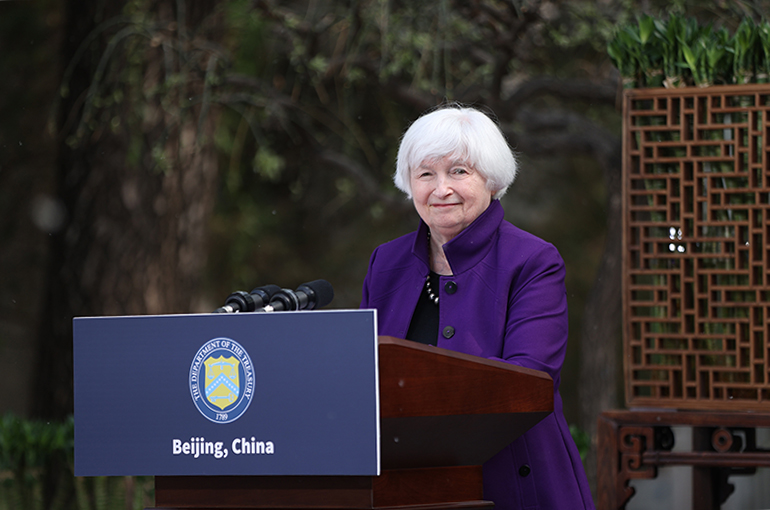 US Doesn’t Seek China Decoupling, Yellen Says
US Doesn’t Seek China Decoupling, Yellen Says(Yicai) April 9 -- “The United States does not seek to decouple from China,” Treasury Secretary Janet Yellen said during her second visit to China in nine months, where she spoke with high-ranking officials about overcapacity and greatly intertwined supply chains.
“Our two economies are deeply integrated, and a wholesale separation would be disastrous for both of our economies,” Yellen said at a press conference in Beijing yesterday.
Since April 4, Yellen has met with Prime Minister Li Qiang, Vice Premier He Lifeng, Finance Minister Lan Foan, and Pan Gongsheng, governor of China’s central bank.
“China welcomes the US statement that it does not seek to decouple from China, and hopes that the US side will take concrete actions to stop sanctions and restrictions on Chinese companies,” Liao Min, vice minister of finance, said at a media briefing yesterday.
Yellen also voiced concern about features of China’s economy that she said were having increasing negative spillovers on the United States and globally.
“I am particularly worried about how China’s enduring macroeconomic imbalances -- namely its weak household consumption and business overinvestment, aggravated by large-scale government support in specific industrial sectors -- will lead to significant risk to workers and businesses in the United States and the rest of the world,” she said. Yellen referenced the electric vehicle, lithium-ion battery, and solar industries.
The accusation of overcapacity in China’s clean energy industry is utterly unjustifiable, Liu Yongtao, a professor at Fudan University, said to Yicai. US economic policy has double standards, he added, citing the example of the Chips and Science Act, which financially supports local semiconductor manufacturers.
Yellen clarified that the concern was constructive in nature.
“Importantly, we have and will continue to emphasize that our concern about overcapacity is not animated by anti-China sentiment or a desire to decouple,” she said. “Rather, it is driven by a desire to prevent global economic dislocation and move toward a healthy economic relationship with China.”
Editors: Dou Shicong, Emmi Laine